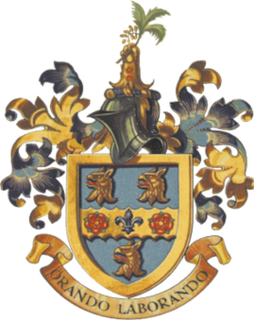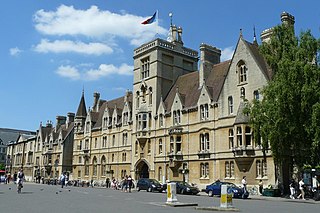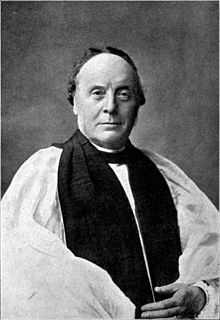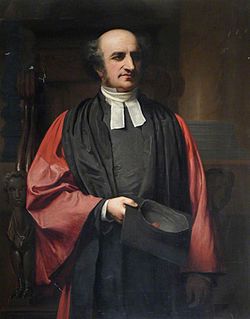Edward Parry (14 January 1830 – 11 April 1890) was a Bishop of Dover. [1]
The Bishop of Dover is an episcopal title used by a suffragan bishop of the Church of England Diocese of Canterbury, England, The title takes its name after the town of Dover in Kent. The Bishop of Dover holds the additional title of "Bishop in Canterbury" and is empowered to act almost as if he were the diocesan bishop of Canterbury, since the actual diocesan bishop is based at Lambeth Palace in London, and thus is frequently away from his diocese, fulfilling national and international duties. Among other things, this gives the Bishop of Dover an ex officio seat in the Church's General Synod. Until recently, there was another proper suffragan, the Bishop of Maidstone, who did not have the same extra powers.
Parry was the son of William Parry, Arctic explorer, and Isabella Louisa, his wife, fourth daughter of the John Stanley, 1st Baron Stanley of Alderley. [2]

Rear-Admiral Sir William Edward Parry was an English explorer of the Arctic who was known for his 1819 expedition through the Parry Channel, probably the most successful in the long quest for the Northwest Passage.
John Thomas Stanley, 1st Baron Stanley of Alderley, known as Sir John Stanley, 7th Baronet, from 1807 to 1839, was a British peer and politician.
Parry was educated at Rugby School and Balliol College, Oxford [2] and began his ordained ministry as a curate in Norham. [3] After time as chaplain to the Bishop of London, Archibald Campbell Tait, [4] he became Rural Dean of Ealing. In 1869 he was appointed Archdeacon of Canterbury and on the Feast of the Annunciation, 25 March 1870, was consecrated [5] the fourth Bishop of Dover (suffragan bishop in the Diocese of Canterbury), 273 years after the death of the third bishop. [6] A monument to him is in Canterbury Cathedral. [7] In 1882 he was chosen by the Australian bishops to succeed the late Frederic Barker as Bishop of Sydney and Metropolitan of Australia, but he declined the nomination. [2]

Rugby School is a day and boarding co-educational independent school in Rugby, Warwickshire, England. Founded in 1567 as a free grammar school for local boys, it is one of the oldest independent schools in Britain. Up to 1667, the school remained in comparative obscurity. Its re-establishment by Thomas Arnold during his time as Headmaster, from 1828 to 1841, was seen as the forerunner of the Victorian public school. It is one of the original seven Great Nine Public Schools defined by the Clarendon Commission of 1864. Rugby School was also the birthplace of Rugby football. In 1845, three Rugby School pupils produced the first written rules of the "Rugby style of game".

Balliol College is one of the constituent colleges of the University of Oxford in England. One of Oxford's oldest colleges, it was founded around 1263 by John I de Balliol, a rich landowner from Barnard Castle in County Durham, who provided the foundation and endowment for the college. When de Balliol died in 1269 his widow, Dervorguilla, a woman whose wealth far exceeded that of her husband, continued his work in setting up the college, providing a further endowment, and writing the statutes. She is considered a co‑founder of the college.

A curate is a person who is invested with the care or cure (cura) of souls of a parish. In this sense, "curate" correctly means a parish priest; but in English-speaking countries the term curate is commonly used to describe clergy who are assistants to the parish priest. The duties or office of a curate are called a curacy.
Parry's sons, Edward and Sydney were, respectively, Bishop of Guyana (1900–1921) & Archbishop of the West Indies (1917–1921), [8] and a senior British civil servant. Sydney wrote the article about his father in the Dictionary of National Biography .
Sir Frederick Sydney Parry was a senior British civil servant.
The Archbishop of the West Indies is the Anglican primate of the Province of the West Indies, part of the worldwide Anglican Communion.

The Dictionary of National Biography (DNB) is a standard work of reference on notable figures from British history, published since 1885. The updated Oxford Dictionary of National Biography (ODNB) was published on 23 September 2004 in 60 volumes and online, with 50,113 biographical articles covering 54,922 lives.








